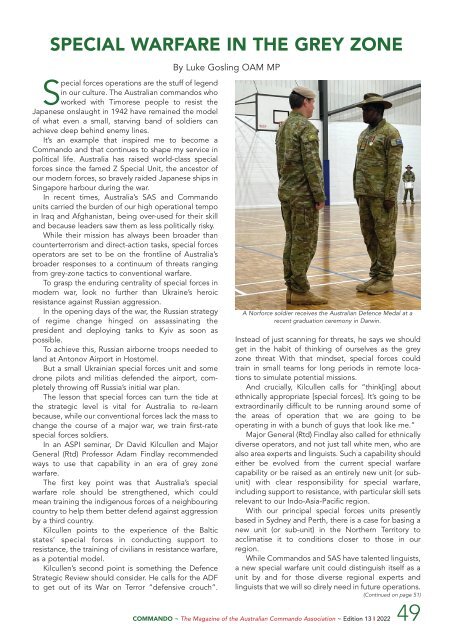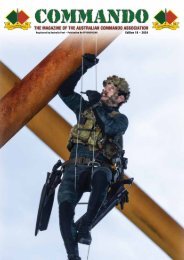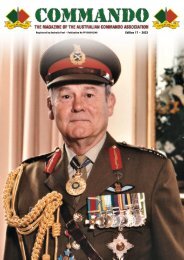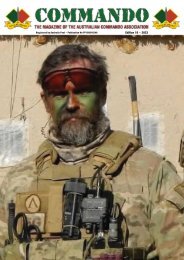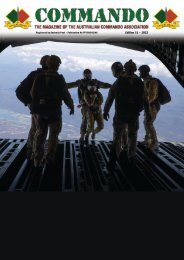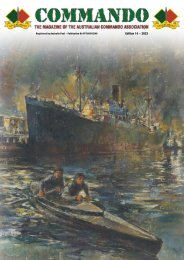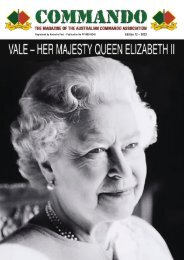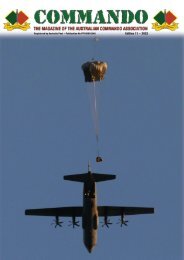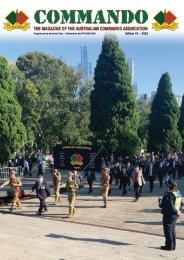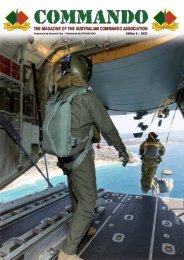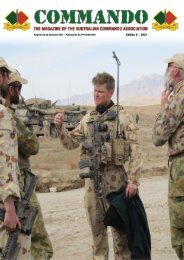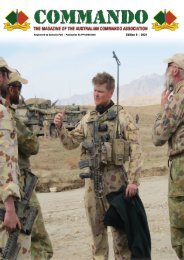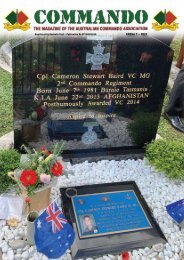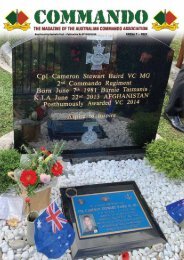Commando News Edition 13, 2022
You also want an ePaper? Increase the reach of your titles
YUMPU automatically turns print PDFs into web optimized ePapers that Google loves.
SPECIAL WARFARE IN THE GREY ZONE<br />
Special forces operations are the stuff of legend<br />
in our culture. The Australian commandos who<br />
worked with Timorese people to resist the<br />
Japanese onslaught in 1942 have remained the model<br />
of what even a small, starving band of soldiers can<br />
achieve deep behind enemy lines.<br />
It’s an example that inspired me to become a<br />
<strong>Commando</strong> and that continues to shape my service in<br />
political life. Australia has raised world-class special<br />
forces since the famed Z Special Unit, the ancestor of<br />
our modern forces, so bravely raided Japanese ships in<br />
Singapore harbour during the war.<br />
In recent times, Australia’s SAS and <strong>Commando</strong><br />
units carried the burden of our high operational tempo<br />
in Iraq and Afghanistan, being over-used for their skill<br />
and because leaders saw them as less politically risky.<br />
While their mission has always been broader than<br />
counterterrorism and direct-action tasks, special forces<br />
operators are set to be on the frontline of Australia’s<br />
broader responses to a continuum of threats ranging<br />
from grey-zone tactics to conventional warfare.<br />
To grasp the enduring centrality of special forces in<br />
modern war, look no further than Ukraine’s heroic<br />
resistance against Russian aggression.<br />
In the opening days of the war, the Russian strategy<br />
of regime change hinged on assassinating the<br />
president and deploying tanks to Kyiv as soon as<br />
possible.<br />
To achieve this, Russian airborne troops needed to<br />
land at Antonov Airport in Hostomel.<br />
But a small Ukrainian special forces unit and some<br />
drone pilots and militias defended the airport, com -<br />
pletely throwing off Russia’s initial war plan.<br />
The lesson that special forces can turn the tide at<br />
the strategic level is vital for Australia to re-learn<br />
because, while our conventional forces lack the mass to<br />
change the course of a major war, we train first-rate<br />
special forces soldiers.<br />
In an ASPI seminar, Dr David Kilcullen and Major<br />
General (Rtd) Professor Adam Findlay recommended<br />
ways to use that capability in an era of grey zone<br />
warfare.<br />
The first key point was that Australia’s special<br />
warfare role should be strengthened, which could<br />
mean training the indigenous forces of a neighbouring<br />
country to help them better defend against aggression<br />
by a third country.<br />
Kilcullen points to the experience of the Baltic<br />
states’ special forces in conducting support to<br />
resistance, the training of civilians in resistance warfare,<br />
as a potential model.<br />
Kilcullen’s second point is something the Defence<br />
Strategic Review should consider. He calls for the ADF<br />
to get out of its War on Terror “defensive crouch”.<br />
By Luke Gosling OAM MP<br />
A Norforce soldier receives the Australian Defence Medal at a<br />
recent graduation ceremony in Darwin.<br />
Instead of just scanning for threats, he says we should<br />
get in the habit of thinking of ourselves as the grey<br />
zone threat With that mindset, special forces could<br />
train in small teams for long periods in remote loca -<br />
tions to simulate potential missions.<br />
And crucially, Kilcullen calls for “think[ing] about<br />
ethnically appropriate [special forces]. It’s going to be<br />
extraordinarily difficult to be running around some of<br />
the areas of operation that we are going to be<br />
operating in with a bunch of guys that look like me.”<br />
Major General (Rtd) Findlay also called for ethnically<br />
diverse operators, and not just tall white men, who are<br />
also area experts and linguists. Such a capability should<br />
either be evolved from the current special warfare<br />
capability or be raised as an entirely new unit (or subunit)<br />
with clear responsibility for special warfare,<br />
including support to resistance, with particular skill sets<br />
relevant to our Indo-Asia-Pacific region.<br />
With our principal special forces units presently<br />
based in Sydney and Perth, there is a case for basing a<br />
new unit (or sub-unit) in the Northern Territory to<br />
acclimatise it to conditions closer to those in our<br />
region.<br />
While <strong>Commando</strong>s and SAS have talented linguists,<br />
a new special warfare unit could distinguish itself as a<br />
unit by and for those diverse regional experts and<br />
linguists that we will so direly need in future operations.<br />
(Continued on page 51)<br />
COMMANDO ~ The Magazine of the Australian <strong>Commando</strong> Association ~ <strong>Edition</strong> <strong>13</strong> I <strong>2022</strong> 49


